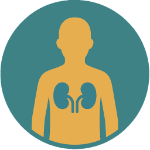Protecting Your Kidneys
Before Disease Develops
Kidney disease often develops quietly, with few noticeable symptoms until the condition has already advanced. This is why prevention is so important. Both Western medicine and Traditional Chinese Medicine (TCM) emphasize early action, though they describe it in different ways. Western medicine points to risk factors such as high blood pressure, diabetes, and obesity. TCM looks at lifestyle habits, seasonal living, and the preservation of essence, or jing, as key to protecting kidney health.
Kidney Prevention Tips
- Keep blood pressure and blood sugar in a healthy range
- Get enough rest and avoid overwork
- Protect the lower back and feet from cold, especially in winter
- Eat kidney-nourishing foods such as black beans and walnuts
- Practice moderate activity like walking, qigong, or taijiquan
In Western practice, keeping blood pressure and blood sugar under control is considered the cornerstone of prevention. Regular checkups, balanced diet, physical activity, and avoiding smoking are widely recommended. These measures reduce the strain on the kidneys and lower the chance of developing Chronic Kidney Disease (CKD) later in life. Early detection through blood and urine tests allows intervention before permanent damage occurs.
From the TCM perspective, prevention is about conserving kidney energy throughout life. The kidneys are seen as the root of growth and aging, storing the jing that fuels resilience. Habits such as overwork, staying up late, or chronic stress are believed to drain this essence, leading to weakness long before laboratory tests would show a problem. Practices like getting adequate sleep, moderating sexual activity, and protecting the lower back and feet from cold are traditional methods of safeguarding kidney vitality.
Dietary habits also play a central role. Western guidelines emphasize reducing excess salt, maintaining a healthy weight, and eating more vegetables and whole grains. TCM dietary therapy adds another layer, recommending foods that nourish the kidneys, such as black beans, walnuts, and goji berries, while avoiding excess alcohol and heavily processed foods. Cooking methods that are gentle and warming, like soups and congees, are thought to support digestion and energy conservation.
Exercise is encouraged in both systems, though with slightly different emphasis. Western advice focuses on cardiovascular health, while TCM promotes moderate, balanced activity that cultivates energy without exhaustion. Walking, taijiquan, and qigong are examples of practices that keep circulation strong while also protecting the body’s reserves.
Preventing kidney disease is not about one strict formula, but about daily choices that add up over time. By blending the Western focus on medical risk factors with the TCM view of energy preservation, people can create a lifestyle that truly protects the kidneys before disease ever has a chance to take hold.
Vocabulary Guide
- Jing (精) – Essence stored in the kidneys, the foundation of growth, vitality, and longevity.
- Kidney essence (肾精) – The inherited and acquired strength of the kidneys, essential for resilience and aging.
- Congee (粥) – A rice porridge used in TCM dietary therapy to strengthen digestion and conserve energy.
- Taijiquan (太极拳) – A traditional practice combining movement, meditation, and health cultivation.
- Qigong (气功) – Gentle breathing and movement exercises that preserve and balance energy.



